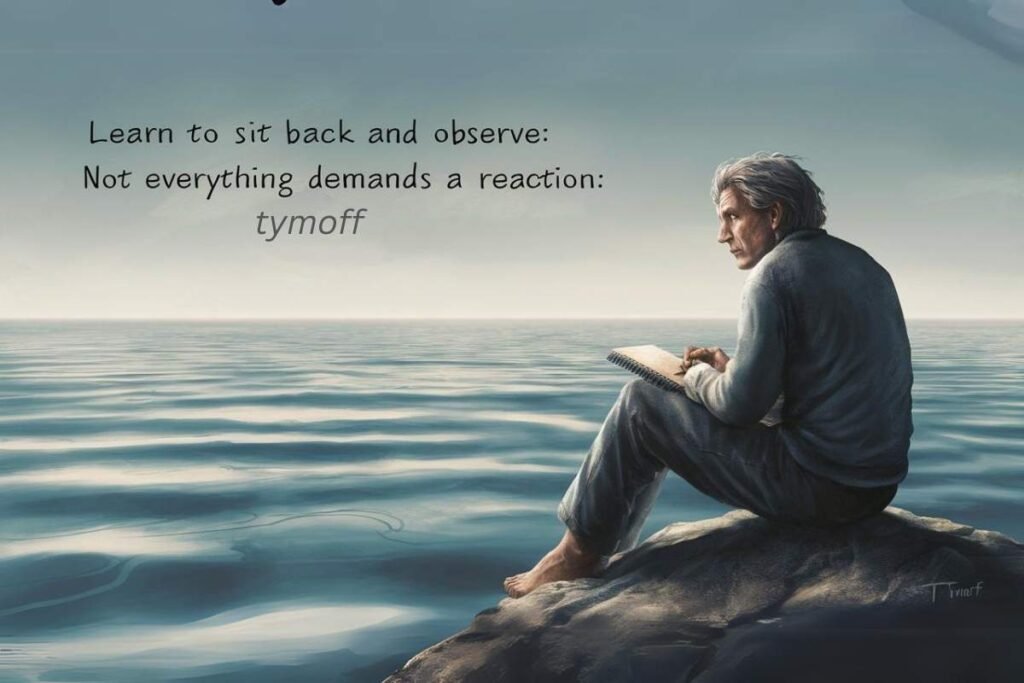Table of Contents
In the digital age, where information is instant and reactions are often immediate, the wisdom of taking a step back to observe before responding has never been more crucial.
The phrase “Learn To Sit Back And Observe: Not Everything Demands A Reaction – tymoff” encapsulates a profound philosophy that can transform our personal and professional lives.
This article delves into the essence of this concept, exploring its significance, benefits, and practical applications.
The Essence of Observation

Understanding Observation
Observation is more than just seeing or hearing. It involves a conscious effort to notice details, understand contexts, and interpret meanings without immediately jumping to conclusions or actions.
By cultivating the skill to “Learn To Sit Back And Observe: Not Everything Demands A Reaction – tymoff,” we can gain deeper insights into situations and make more informed decisions.
Historical Perspective
Throughout history, great thinkers and leaders have emphasized the importance of observation. Confucius, for example, valued reflection and observation as key components of wisdom.
Similarly, in the realm of science, figures like Charles Darwin and Galileo Galilei made groundbreaking discoveries through meticulous observation.
The Art of Non-Reaction
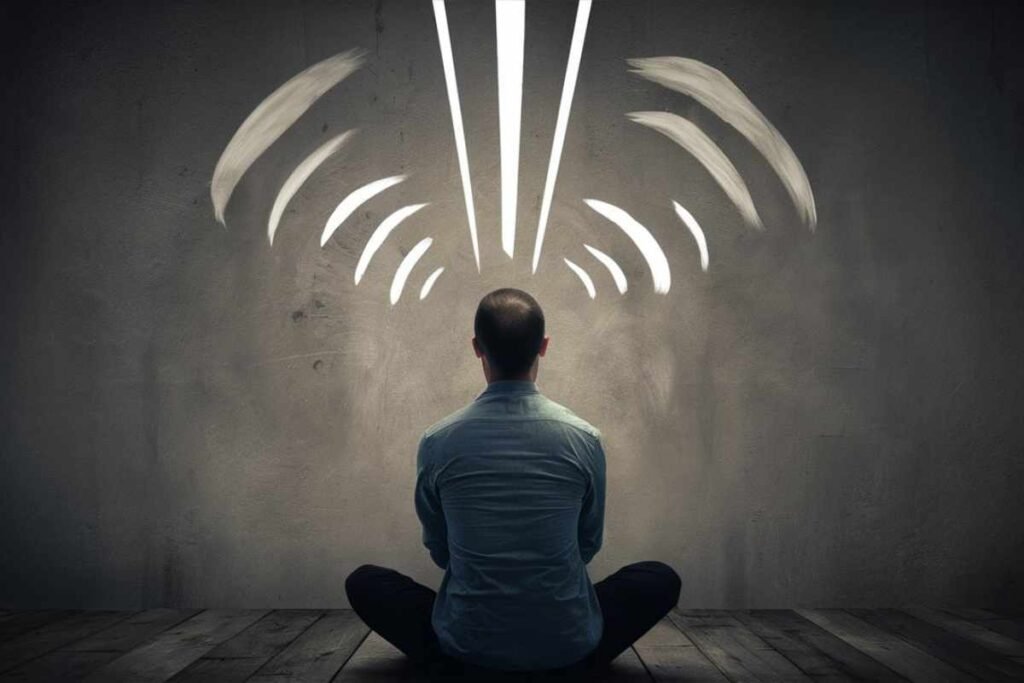
The Impulse to React
Modern life is filled with stimuli that demand our attention and prompt immediate reactions. Social media notifications, breaking news, and workplace dynamics all contribute to a culture of instant responsiveness.
However, this tendency to react swiftly can often lead to misunderstandings, conflicts, and regret.
The Power of Non-Reaction
Adopting the mantra “Learn To Sit Back And Observe: Not Everything Demands A Reaction – tymoff” encourages us to pause and reflect before responding.
This practice of non-reaction allows us to consider our actions more carefully, ensuring that our responses are thoughtful and appropriate. It’s not about passivity, but about choosing when and how to engage.
Benefits of Non-Reaction
Emotional Regulation: By not reacting impulsively, we can manage our emotions better, reducing stress and anxiety.
Improved Relationships: Thoughtful responses foster better understanding and empathy, strengthening our connections with others.
Better Decision-Making: Observation provides valuable insights, leading to more informed and effective decisions.
Personal Growth: Reflecting on our actions and experiences promotes self-awareness and personal development.
Practical Applications in Daily Life

Mindfulness and Observation
Mindfulness involves being present in the moment and fully engaging with our surroundings. By integrating mindfulness practices, such as meditation and deep breathing, we can enhance our ability to “Learn To Sit Back And Observe: Not Everything Demands A Reaction – tymoff.”
This approach helps us become more aware of our thoughts and emotions, allowing us to respond with intention rather than impulse.
Journaling as a Tool for Reflection
Journaling is an effective way to process observations and reflections. By writing down our thoughts and experiences, we can gain clarity and perspective.
This practice not only aids in self-discovery but also reinforces the habit of pausing and reflecting before reacting.
Active Listening in Communication
In our interactions with others, active listening plays a crucial role. By truly listening and observing the speaker’s words, tone, and body language, we can better understand their perspective.
This empathetic approach fosters deeper connections and reduces the likelihood of misunderstandings.
Professional Contexts
In the workplace, the ability to “Learn To Sit Back And Observe: Not Everything Demands A Reaction – tymoff” can be particularly beneficial.
It allows for more strategic thinking and decision-making, promotes a calm and composed demeanor, and enhances leadership qualities. Leaders who observe and reflect before acting are often more respected and effective.
Case Studies and Real-Life Examples

Historical Leaders
Several historical figures have exemplified the power of observation and non-reaction. Mahatma Gandhi, for instance, was known for his ability to remain calm and reflective, even in the face of intense adversity.
His approach allowed him to lead a successful non-violent movement for India’s independence.
Modern Day Scenarios
In contemporary settings, individuals like Warren Buffet and Bill Gates have attributed their success to the habit of careful observation and thoughtful decision-making.
These leaders emphasize the importance of taking the time to gather information and reflect before making significant moves.
Personal Stories
Personal anecdotes from individuals who have adopted the principle of “Learn To Sit Back And Observe: Not Everything Demands A Reaction – tymoff” can also provide valuable insights.
For instance, a teacher who observes students’ behavior and emotions before responding can create a more supportive and effective learning environment.
Techniques to Cultivate Observation
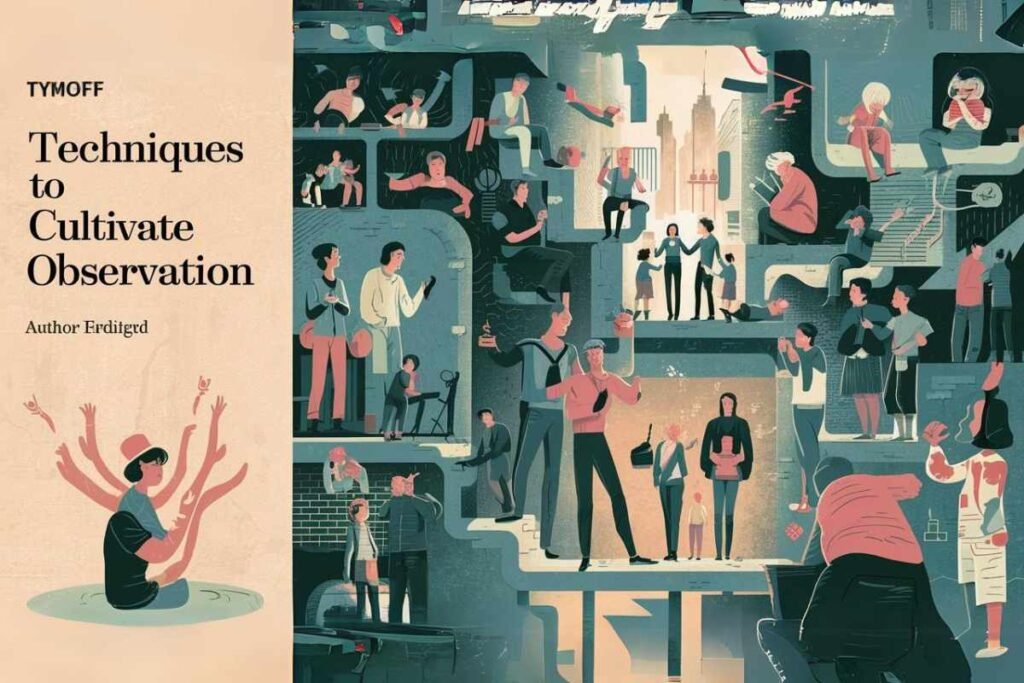
Meditation and Mindfulness Practices
Regular meditation and mindfulness exercises can enhance our ability to observe without immediate reaction.
Techniques such as focused breathing, body scans, and mindful walking help train the mind to stay present and attentive.
Regular Reflection and Evaluation
Setting aside time for regular reflection, whether through journaling or quiet contemplation, allows us to review our actions and decisions.
This practice helps identify patterns and areas for improvement, fostering continuous personal growth.
Seeking Feedback
Actively seeking feedback from others can provide new perspectives and enhance our observational skills.
Constructive criticism and different viewpoints help us see situations more comprehensively and make better-informed decisions.
Setting Boundaries
In a world that demands constant engagement, setting boundaries is essential. By consciously choosing when to engage and when to step back, we can protect our mental and emotional well-being. This intentional approach allows us to respond thoughtfully rather than react impulsively.
Overcoming Challenges

Managing the Urge to React
One of the main challenges in adopting the principle of “Learn To Sit Back And Observe: Not Everything Demands A Reaction – tymoff” is managing the innate urge to react.
Techniques such as deep breathing, counting to ten, or taking a short walk can help create the necessary space for observation and reflection.
Dealing with External Pressures
External pressures, whether from social media, work, or personal relationships, can make it difficult to remain observant and non-reactive.
Establishing clear priorities and maintaining a focus on long-term goals can help mitigate these pressures and reinforce the habit of thoughtful observation.
Building Patience
Cultivating patience is essential for effective observation. Practices such as mindful meditation, gratitude journaling, and spending time in nature can enhance our patience and ability to observe without immediate reaction.
Integrating Observation into Society
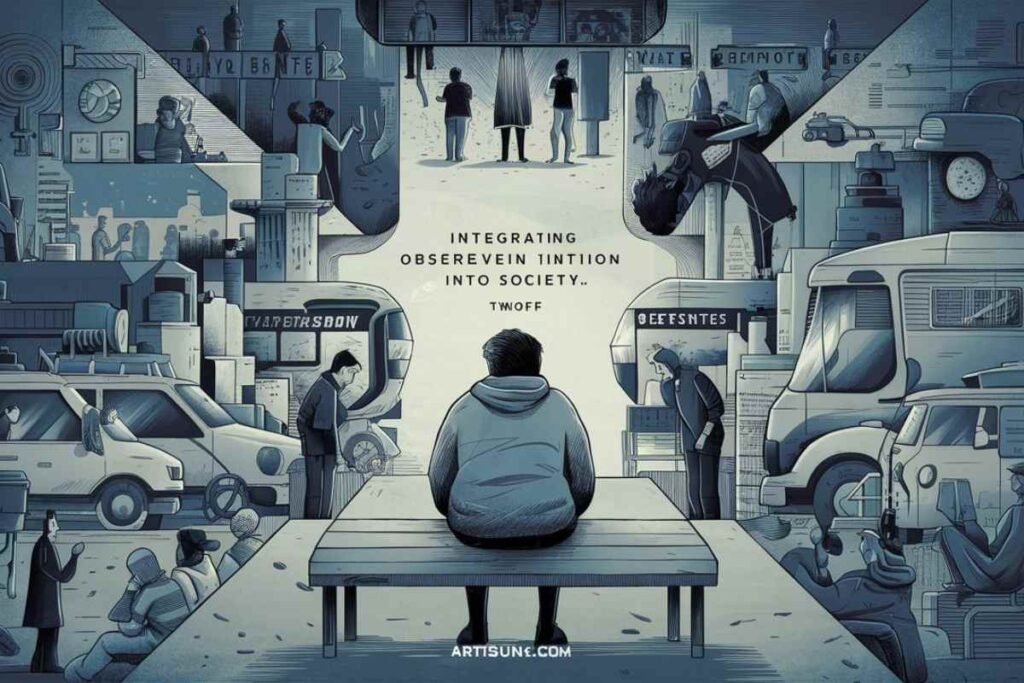
Educational Systems
Incorporating the principle of “Learn To Sit Back And Observe: Not Everything Demands A Reaction – tymoff” into educational curricula can help students develop critical thinking and emotional intelligence.
Teaching mindfulness, reflective practices, and active listening skills can prepare students for more thoughtful and empathetic interactions in their personal and professional lives.
Corporate Culture
Organizations can benefit from fostering a culture of observation and reflection. Encouraging employees to take time for thoughtful consideration before making decisions can enhance productivity, creativity, and workplace harmony.
Training programs that emphasize mindfulness and effective communication can support this cultural shift.
Community Engagement
On a broader societal level, promoting the values of observation and non-reaction can lead to more compassionate and understanding communities.
Community programs that focus on conflict resolution, active listening, and empathy training can help individuals navigate social interactions more effectively.
The Future of Non-Reaction
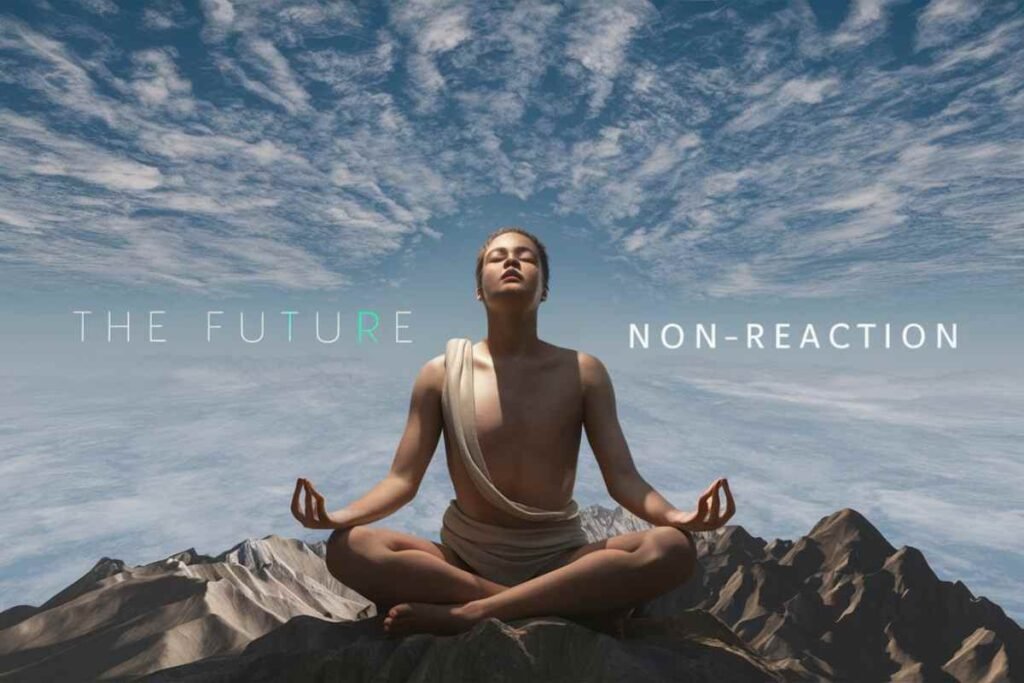
Technological Integration
As technology continues to evolve, integrating tools that promote mindfulness and observation into our daily lives can be beneficial.
Apps and online platforms that offer guided meditations, reflective journaling prompts, and mindfulness exercises can support individuals in cultivating these skills.
Research and Development
Ongoing research into the benefits of observation and non-reaction can provide further evidence of their value.
Studies on the impact of mindfulness practices on mental health, productivity, and interpersonal relationships can help promote these principles more widely.
Global Impact
By embracing the philosophy of “Learn To Sit Back And Observe: Not Everything Demands A Reaction – tymoff” on a global scale, we can foster a more peaceful and collaborative world.
Encouraging individuals and societies to prioritize thoughtful observation and intentional action can lead to more sustainable and harmonious ways of living.
Conclusion
In conclusion, embracing the philosophy encapsulated in “Learn To Sit Back And Observe: Not Everything Demands A Reaction – tymoff” can profoundly impact our personal and professional lives.
By cultivating the art of observation and non-reaction, we can navigate the complexities of modern life with greater wisdom, intention, and tranquility.
This practice not only enhances our emotional regulation, decision-making, and relationships but also promotes personal growth and societal harmony.
As we integrate mindfulness, reflective practices, and active listening into our daily routines, we create a more thoughtful and compassionate world, where responses are measured and purposeful, leading to more meaningful and positive outcomes.
FAQs
What does the phrase “Learn To Sit Back And Observe: Not Everything Demands A Reaction – tymoff” mean?
This phrase encourages taking a step back to observe and reflect on situations before reacting, emphasizing that not all events require an immediate response.
Why is observation important?
Observation helps us understand details, contexts, and meanings more deeply, leading to better decision-making and personal growth.
How can non-reaction benefit me?
Non-reaction aids in emotional regulation, improves relationships, enhances decision-making, and promotes personal growth by allowing thoughtful and intentional responses.
What are some practical ways to practice observation?
Practices like mindfulness meditation, journaling, and active listening can help cultivate the habit of observation and reflection.
How can I manage the urge to react impulsively?
Techniques such as deep breathing, counting to ten, and taking short walks can help create space for observation and thoughtful response.
How can this principle be applied in professional settings?
In the workplace, observing before reacting can lead to more strategic decision-making, improved leadership, and a calmer, more composed demeanor.
What challenges might I face in adopting this practice?
Challenges include managing the innate urge to react, dealing with external pressures, and cultivating patience.
How can observation and non-reaction be integrated into society?
Integrating these principles into educational curricula, corporate culture, and community programs can promote critical thinking, empathy, and conflict resolution on a broader scale.
